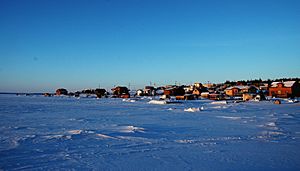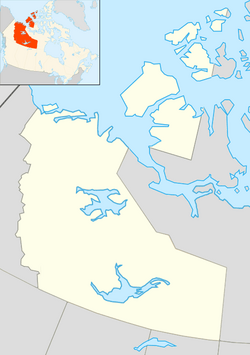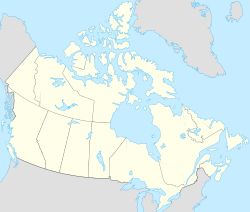Łutselk'e facts for kids
Quick facts for kids
Łutselkʼe
Łutsël Kʼé; Snowdrift (pre-1992)
|
|
|---|---|
|
First Nation - Designated Authority of Łutselkʼe
|
|

Łutselkʼe on Great Slave Lake
|
|
| Country | Canada |
| Territory | Northwest Territories |
| Region | North Slave |
| Territorial electoral district | Tu Nedhé-Wiilideh |
| Census division | Region 5 |
| Area | |
| • Land | 43.18 km2 (16.67 sq mi) |
| Elevation | 168 m (551 ft) |
| Population
(2016)
|
|
| • Total | 303 |
| • Density | 7.0/km2 (18/sq mi) |
| Time zone | UTC−7 (MST) |
| • Summer (DST) | UTC−6 (MDT) |
| Canadian Postal code |
X
|
| Area code(s) | 867 |
| Telephone exchange | 370 |
| - Living cost | 167.5 |
| - Food price index | 184.0 |
| Sources: Department of Municipal and Community Affairs, Prince of Wales Northern Heritage Centre, Canada Flight Supplement 2013 figure based on Edmonton = 100 2012 figure based on Yellowknife = 100 |
|
Łutselkʼe (pronounced LOOT-sel-kay) is a small community in the Northwest Territories, Canada. Its name comes from the Dëne Sųłıné Yatıé and means "place of the cisco." A cisco is a type of small fish. This community is located on the south shore, near the eastern end of Great Slave Lake. Before July 1, 1992, Łutselkʼe was known as Snowdrift. This old name came from the nearby Snowdrift River.
Contents
History of Łutselkʼe
Łutselkʼe is a First Nation community. The land around Łutselkʼe has been the traditional home of the Chipewyan Dene people for a very long time. In 1925, a trading post was opened here by the Hudson's Bay Company. Soon after, the Roman Catholic Church also became part of the community. A school for children opened in 1960.
Protecting the Land: Thaidene Nene National Park
There is a plan to create a large protected area called Thaidene Nene National Park Reserve. This park would cover about 14,000 square kilometers. The people of Łutselkʼe strongly support this idea. Creating this park would help protect the land and wildlife that are important to their culture and way of life.
People and Languages
In 2021, about 333 people lived in Łutselkʼe. Most of the people living here are First Nations. There are also some Métis and Inuit people. The main languages spoken in the community are Denesuline and English.
Many people in Łutselkʼe speak an Indigenous language as their first language. In 2016, 105 people spoke Dene (Chipewyan or Denesuline). A few others spoke Dogrib or Tłı̨chǫ and North Slavey or Hare. Almost everyone in the community knows English.
Community Services
Łutselkʼe has several important services for its residents. These services help make life in the community safe and comfortable.
Health and Safety
- Police Services: The community has a small Royal Canadian Mounted Police (RCMP) detachment. Two officers work there to help keep everyone safe.
- Health Centre: There is a health centre with two nurses. They provide medical care to the people of Łutselkʼe.
Shopping and Learning
- Grocery Store: The Lutselk'e Co-op is the only grocery store in the community.
- Post Office: There is a post office where people can send and receive mail.
- Education: Children attend the Lutsel Kʼe Dene School. This school offers programs from kindergarten all the way to grade 12. There is also a community learning centre run by Aurora College for adults.
Travel and Transportation
Łutselkʼe is not connected by road to other communities. This means people travel in other ways.
- Airport: The Lutselk'e Airport has regular flights to Yellowknife.
- Water Travel: During the summer, when the lake is not frozen, the Lutselk'e Water Aerodrome can be used by floatplanes. Also, large ships bring supplies to the community once a year. This is called a sealift and comes from Hay River.
First Nations Government
The community of Łutselkʼe is represented by the Łutsël K'é Dene First Nation. They are part of the larger Akaitcho Territory Government. This government helps make decisions for the community and region.
 | Stephanie Wilson |
 | Charles Bolden |
 | Ronald McNair |
 | Frederick D. Gregory |



